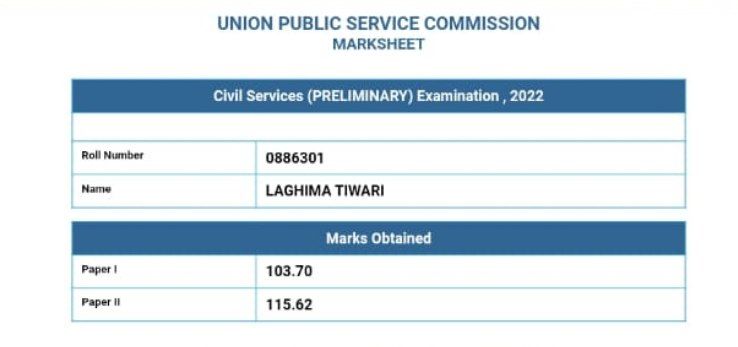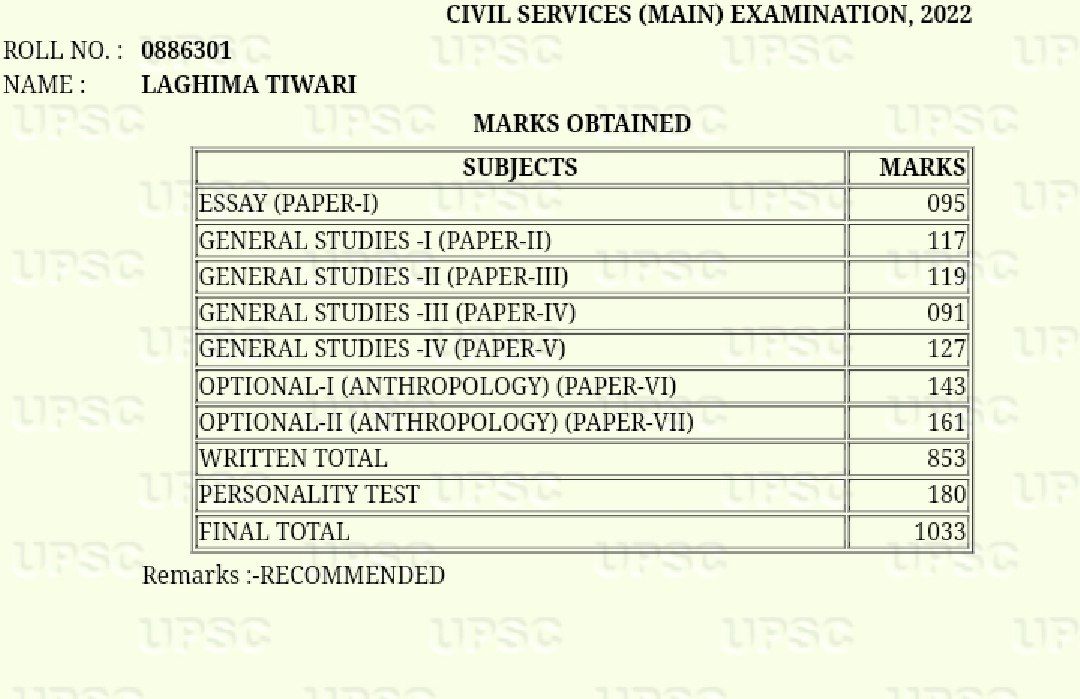Clarification on coachings -
Since many institutes are using my pictures and will continue doing so in future, I am writing this post.
I have NOT taken CLASSROOM COACHING from any institute, neither for GS nor for optional. Though, I have taken Test series and Mock interviews at all the 3 stages.
My REASON for not joining classroom coaching -
1. GS - I did not feel the need as I had figured out what to read, how to read through toppers talk on Internet, plus my home is situated in Delhi itself but it takes around 2 hours to reach ORN, I could not spare so much travelling time every day and did not want to live in PG when my home was in the same city.
2. Optional - I was willing to take coaching for optional as I was advised that it requires greater depth. I even contacted few institutes, but either the course timing was not suiting me, whereas at some other places I received a rather dull response. So I decided I should prepare it on my own, ofc through help from internet.
My suggestion - If anyone feels the need of coaching, they should definitely go for it. For some people, it can do wonders, while others do not feel so much need. So decide accordingly based on your strengths and weaknesses. Even, if you are not taking coaching, my suggestion is to at least join some test series which will keep you in loop of preparation.
TEST SERIES & MOCK INTERVIEWS
1. Prelims stage
- Insights on India - IPM 1.0 (Integrated prelims and mains test series)
- Forum IAS : Free online simulation test (not paid test series)
2. Mains stage
- GS : Vision IAS All India test series
- Anthropology - L2A test series
3. Interview stage - mocks I took (since my interview was on 18th April, on a later date and it was my 1st time, I took many mocks)
- Vajirao and Reddy
- Chahal academy
- KSG
- Unacademy
- Samkalp
- Chanakya Mandal
- Next IAS
- Drishti IAS
- Insights
- Vision IAS (only DAF discussion, no mock)
- Vajiram and Ravi (only one to one with Ravindran sir, no mock)
ANTHROPOLOGY STRATEGY
I have taken inspiration from previous year toppers like Anudeep Durishetty sir, Sachin Gupta Sir, Akshat Jain sir and many more. So, many things will be repeated from their strategies.
I devoted around 5-6 months for my optional and did not take any classroom coaching. I only joined optional test series once my prelims was cleared.
- GENERAL STRATEGY : Take print out of optional syllabus and stick to it at all costs. Shreyans kumat sir had prepared an evernote document of PYQs of anthropology upto 2017, I downloaded it from his blog and updated it upto 2021. I will soon upload the same documents here. Syllabus and PYQs were the 2 constant things I referred to while preparing my optional. I had prepared my own handwritten notes for anthropology in question - answer format and just revised the same again and again.
For each section as mentioned in syllabus, I had written down a template/ format in which I will write the answer. For instance, for thinkers part - FORMAT - Intro -> Their published books -> Their contribution -> Merits & Demerits -> Conclusion.
- MY PREPARATION ORDER : (I had read Sapiens in college which increased my interest in physical anthropology, you can also read similar books to see if you will like the subject, though there is hardly 10% similarity but still one gets a broad idea)
Started with Unit 6 (Thinkers) -> Unit 2,3,4,5 (Socio-cultural) -> Unit 1.4, 1.5, 1.6 (skipped 1.7) -> Unit 9, 10, 11, 12 -> Unit 7 & 8 -> Unit 1.1, 1.2 & 1.3 -> Unit 1.8 (Archaeology part in paper 1)
Paper 2 : Continued with archaeology (unit 1.1, 1.2, 1.3) -> then followed the natural order of syllabus for paper 2
BOOKLIST
PAPER 1
Unit 6 - Telugu academy notes on thinkers, University of alabama website (https://anthropology.ua.edu/anthropological-theories/), youtube videos & documentaries on Margaret mead, Mallinowski etc; spend a good amount of time understanding thinkers, PYQs have large portion dedicated to unit 6
Unit 2, 3, 4, 5 - In search of ourselves (by NK Vaid), Anthropology simplified (by Dr Vivek Bhasme), Ember and Ember (Edition - 15th, chapter - 12, 15,16,17,19,20,22,23)
Unit 1.4, 1.5, 1.6 - P. Nath, Anthropology simplified (by Dr Vivek Bhasme), Ember and ember (Edition 15th, Chapter 5,6,7,8)
Unit 9.1 - 9.4 : P. Nath, Anthropology simplified (by Dr Vivek Bhasme), Akshat Jain Sir's book, Ember and ember (Edition 15th, Chapter 3)
Unit 9.5 - P.Nath, Anthropology simplified (by Dr Vivek Bhasme), Ember and ember (Edition 15th, Chapter 4)
Unit 9.6 - Anthropology simplified (by Dr Vivek Bhasme), Akshat Jain Sir's book
Unit 9.7, 9.8 - P.Nath, Akshat Jain Sir's book, Ember and ember (Edition 15th, Chapter 4, 25)
Unit 10, 11, 12 - P. Nath, Anthropology simplified (by Dr Vivek Bhasme), Akshat Jain Sir's book
Unit 7 - Ember & ember (Edition 15th, Ch - 14); Anthropology simplified (by Dr Vivek Bhasme)
Unit 8 - Anthropology simplified (by Dr Vivek Bhasme), Akshat Jain Sir's book, Braintree material
Unit 1.1, 1.2, 1.3 - Anthropology simplified (by Dr Vivek Bhasme), Akshat Jain Sir's book
Paper 1 Unit 1.8 & Paper- 2 Unit 1.1 (Archaeology) - Indian Prehistory (DK Bhattacharya), youtube videos by DK Bhattacharya, Akshat Jain Sir's book
PAPER 2
Unit 1.2, 1.3 - Anthropology simplified (by Dr Vivek Bhasme), Akshat Jain Sir's book
Unit 2 - Anthropology simplified (by Dr Vivek Bhasme), Akshat Jain Sir's book
Unit 3.1 - 3.4 : Indian Anthropology (by Nadeem Hasnain), Anthropology simplified (by Dr Vivek Bhasme), Akshat Jain Sir's book
Unit 4 - Indian Anthropology (by Nadeem Hasnain - Annexure 3 at the end), Anthropology simplified (by Dr Vivek Bhasme), Akshat Jain Sir's book
Unit 5.1-5.3 - Indian Anthropology (by Nadeem Hasnain - Annexure 3 at the end), Anthropology simplified (by Dr Vivek Bhasme), Akshat Jain Sir's book
Unit 6,7,8,9 - Tribal India (by Nadeem Hasnain), Anthropology simplified (by Dr Vivek Bhasme), Akshat Jain Sir's book
NOTE -
1. I have extensively referred to e-pathshala & IGNOU material for both paper 1 and paper 2 wherever I found the quality of content lacking. None of the books or general material mentioned above need to be read cover to cover, learn to scan quickly through documents and filter only required part.
2. Minimise repeating your efforts by reading same thing from different sources, instead use different sources for value addition in form of case studies, thinkers name, general egs etc.
3. Search for new case studies because that will make your answers stand out; try to find case studies which you can use at multiple places, it will reduce your task of memorisation to some degree. You can either generally google and scan through various journals etc or refer to sites like down to earth, better india. Even one can pick case studies from newspapers (many times in The Hindu or Indian express good egs of tribes or case studies come, do collect them).
4. Try mentioning thinkers (both mentioned in syllabus or even otherwise) in most of your answers, it makes your answers look well-researched
5. Focus on interlinking different topics both within paper 1 & paper 2, and also across them. You will be able to interlink better once your syllabus is completed at least once, so one can leave this exercise for the end
6. Be curious, try to imbibe the essence of subject/ topic while studying, look out for documentaries, videos in free time (Documentaries on Indian tribes, paleontology part, archaeology etc), these will increase your interest in the subject and your memory retention will also increase, though this exercise is not mandatory but may be somewhat helpful to you in long term.


Comments
Post a Comment